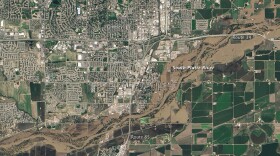In the past week, Ed and Sarah Egloff have experienced enough dramatic events to fill a lifetime. In the hours before their mountain home and cars washed away in the roaring Big Thompson River, the couple waded through deep water. Then they were rescued by helicopter from their tiny town of Drake.
Today they鈥檙e living in Fort Collins, and wading just as deeply into government, insurance and financial bureaucracies.
Through dozens of phone calls every day, the Egloffs are just starting to organize their lives. Upstairs Sarah calls the bank. Downstairs Ed catalogs every one of his electrician鈥檚 tools washed away in the flood. The list is two pages, single spaced.
鈥淵ou can see some things, I knew what year I bought them. But there鈥檚 a lot of stuff that I鈥檝e accumulated over 20 some years of electrical work,鈥� he said.
The Egloffs lived almost two decades in their home and raised their two kids there. This week they learned their flood insurance only covered the structure鈥攏ot their home contents as they had thought.
It鈥檚 one of many frustrations they鈥檝e experienced.
Sarah says a representative for the insurance company told her a site visit would be required to verify damage.
鈥淸They said] 鈥榃ell, we have to find the cars too.鈥� I said, good luck, you鈥檙e going to have to go down the river. They could be in Kansas by now or somewhere,鈥� she said.
Colorado鈥檚 Governor wants as many roads and bridges as possible to be rebuilt by Dec. 1. Until then inspectors have no way of reaching some home sites.
鈥淲e hope that it will be sooner than that,鈥� said Kevin Wynne with the U. The SBA along with the is to flood survivors. Wynne says in addition to temporary living expenses, people like the Egloffs may qualify for low interest loans to help with rebuilding costs not covered by insurance.
"Money still has to be earned.."
鈥淭hat鈥檚 the key thing, people think, well, I won鈥檛 be qualified because this is small business administration,鈥� he said. 鈥淣o, we do loans for homeowners and renters as well.鈥�
So far FEMA has seen 10,000 Colorado assistance applications鈥攊ncluding the Egloffs. Meantime, a half dozen disaster recovery centers set up by local governments across the Front Range are offering assistance with everything from flood clean up to mental health counseling.
For Ed and Sarah Egloff, the focus is less on rebuilding and more on deciding where they鈥檒l be next week.
鈥淚 plan on going back to work probably first thing next week,鈥� said Ed. 鈥淢oney still has to be earned.鈥�
The Egloffs say a key logistical challenge in the next month will be figuring out where they鈥檒l live. Sarah plans to eventually return to her job in Estes Park. Because the roads are out that commute from where they鈥檙e living now would be more than two hours.
Sarah says she has multiple offers of places to stay in Estes Park, and she鈥檒l make decisions about when she鈥檒l return to work in the coming days.
Disaster officials say there are enough resources to go around. Given that magnitude of the disaster across Colorado鈥檚 Front Range, aid will continue to pour into the state







